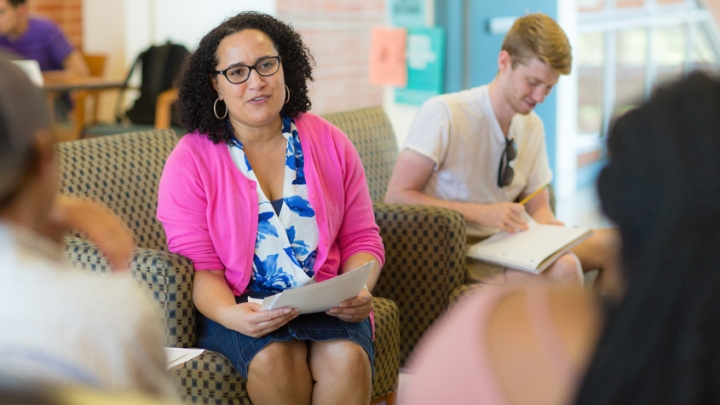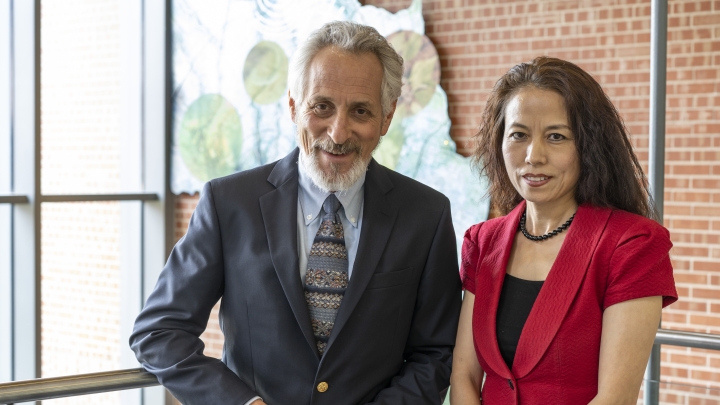
Known as the “singing economist,” professor emeritus Richard V. "Rich" Butler has worn many hats at Trinity University. He has been the acting or interim chair of the urban studies and business administration departments, and he is currently the interim senior director of Alumni Relations. He helped design the Common Curriculum that so many alumni remember, and yes, he also chaired the economics department. To learn more about Butler, including his thoughts on heaven’s music playlist, read on.
When you were teaching, what did you like best about Trinity students?
Trinity was my fourth academic position so I have some basis for comparison. At one of those institutions I had a lot of bright, inquisitive students who didn't want to work very hard. At another, I had very motivated students who were not at all intellectually curious-they just wanted their degrees. Imagine my pleasant surprise on coming to Trinity when I found students who were bright, inquisitive, and willing to put forth serious effort!
That gave me the opportunity to create learning experiences I wouldn't have dared to try elsewhere. For example, my Urban Economics class included a major consulting project in which teams of students solved real problems for real clients. These clients were important, busy people (like Julian Castro, twice our client while he was mayor of San Antonio) with no time to waste on anything less than professional-quality work. It speaks volumes about Trinity students that most of our clients (like Mayor Castro) were repeat customers. Many of the proposals made by these student teams were adopted by their clients. That's powerful. I also loved teaching Intermediate Microeconomics—"boot camp for econ majors"—with a well-earned reputation for being very challenging (which is really a course about how to think logically and analytically). That doesn't come easily to many people, but watching the light bulbs go on as my students "got it" was incredibly rewarding.
How did you get involved in your field of study?
I entered college intending to major in physics, but switched to math early on. I actually spent most of my time in the music department, where I earned to play the organ, sing, and conduct. Music was my first love, but I was advised by the chair of the music department that eating regularly would be challenging if I pursued a musical career. As it happens, I had taken a handful of economics classes, from which I learned that econ was fascinating and came easily to me. When I learned that eating regularly was pretty much a given for economists, my mind was made up. I went to MIT for grad school thinking that I would be a theorist (thanks to that math major) but quickly discovered that it was the parts of economics that dealt with real people and their issues that really interested me. So, I pivoted to urban economics, regulation and environmental economics. Not coincidentally, those (along with intermediate micro) were the primary courses I taught at Trinity.
What other roles have you held on campus?
As soon as I arrived on campus I was drafted to chair the committee that, three years later, produced the Common Curriculum so many alumni remember. I learned a lot about academic politics doing that. I also chaired the University Curriculum Council twice in three years, served as chair of economics for 12 years, as acting director of urban studies for three semesters, as chair of business administration for three years, and as the founding interim dean of the School of Business. When I retired from the faculty in 2016 I signed on for a "part-time" job working on alumni engagement in Alumni Relations and Development. I've really enjoyed that. It turns out that Trinity people are fun when they're alumni, not just when they're students! I'm on my fourth month as interim senior director of Alumni Relations, an assignment that will probably run for another couple of months. It's a good thing that economists are versatile!
Who inspires you and why?
Johann Sebastian Bach. He's arguably the greatest composer of Western music, and he did it all for the glory of God. He produced masterpieces on a weekly basis under working conditions that were far from ideal, no small thing when you have 21 children! I'm convinced that his music is at the top of the playlist in heaven.
What profession other than yours would you like to attempt? Why?
Obviously that would be something in music. Even while pursuing a day job in economics, I've conducted opera, symphonic and choral works, and musical theater, and I continue to work as a professional singer. I used to dream of being a symphony conductor, but now I'm especially interested in early music (from the 16th-18th centuries) so that's my dream niche now.
What are your favorite hobbies?
Music aside, I do like to travel. My wife and I went to New Zealand recently, and we recommend it for a spot on anyone's bucket list. Also, I really do like doing yard work. Unlike the things I've done for a living, when you mow the lawn or trim the shrubs you can see physical evidence that your efforts produced something.
Where would you like to retire?
Home base will always be San Antonio—we've lived here for 36 years, and it's home. However, we vacation in Maine every summer, and it surely would be nice to spend all the hot months up there.
Any other thoughts?
Trinity is truly a special place for me. I'm not an alumnus, but, as the saying goes about Texas, "I got here as soon as I could." I'll be forever grateful to former president Ron Calgaard for taking a chance on me back in 1982 when he was looking for someone to build the economics department, and for the wonderful experience my daughter had as a student here.



